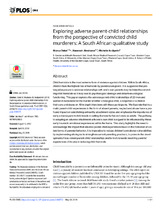Exploring adverse parent-child relationships from the perspective of convicted child murderers: A South African qualitative study
Abstract
Child homicide is the most extreme form of violence against children. Within South Africa,
children face the highest risk of homicide by parents/caregivers. It is suggested that prolonged
exposure to adverse relationships with one's own parents may be linked to committing
child homicide as it may lead to psychological damage and disturb neurological
functioning. This paper explores the adverse parent-child relationships of 22 men and
women incarcerated for the murder of either a biological child, a stepchild or a child in
their care and draws on 49 in-depth interviews with these participants. We illustrate that traumatic
parent-child experiences in the form of absent parents, neglect and abuse have a profound
impact on establishing unhealthy attachment styles and emphasize the importance of
early adverse parent-child bonds in setting the tone for future bonds as adults. The pathway
to adopting an adverse attachment with one's own child is argued to be influenced by these
early traumatic emotional experiences within the home. This study highlights the need to
acknowledge the impact that adverse parent-child experiences have on the formation of violent
forms of parental behavior. It is imperative to reduce children's emotional vulnerabilities
by implementing strategies to strengthen current parenting practices, to promote the development
of less violent parent-child relationships and to work towards resolving parents'
experiences of trauma in reducing child homicide.

